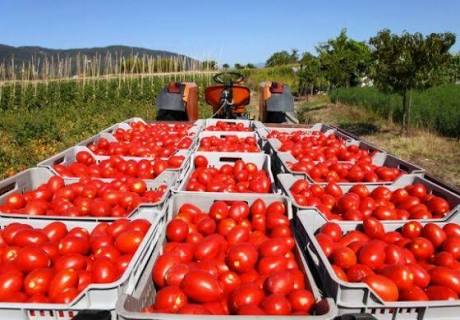Stakeholders in the agriculture sector say Nigeria is yet to feel the impact of the tomato policy six months after it was put in place by the Federal Government.
The News Agency of Nigeria (NAN) reports that the stakeholders told participants at Agra Innovate West Africa forum on Tuesday in Lagos that Nigerians were yet to feel the impact of the policy.
The federal government in April this year announced a new tomato policy aimed at promoting local production of fresh tomato, increasing local production of tomato concentrate and reducing post-harvest losses.
The policy restricts the importation of tomato concentrates to the seaports to address the abuse of the ECOWAS Trade Liberalisation Scheme (ETLS), stops the importation of tomatoes preserved otherwise by vinegar or acetic acid; and increases the tariff on tomato concentrate to 50 per cent with an additional levy of $1,500 per metric ton.
Nigeria imports an average of 150,000 metric tons of tomato concentrate per annum, valued at $170 million, mostly due to inadequate capacity to produce tomato concentrate.
Current demand for fresh tomato fruits is estimated at about 2.45 million metric tonnes per annum, while the country produces only about 1.8 million metric tonnes per annum.
But the stakeholders say many importers are frustrating the tomato policy.
“A lot of importers anticipated the tomato paste policy and filled their warehouses with imported concentrates before the policy even commenced.
” We hope by next year when the importers have exhausted all they have imported before the policy we would begin to see the impact.
“For now, the impact of the tomato paste policy is not yet there,” said Alhaji Abdulkarim Kaita, Managing Director, Dangote Tomato Processing Factory.
According to Kaita, it is one thing to put a policy in place and it is another thing to ensure it is fully implemented.
Emmanuel Ijewere, vice president, Nigeria Agribusiness Group (NABG), said that the policy was slow to have real impact because importers were taking steps at frustrating its success.
“It is taking time for the policy to have impact on the industry. The problem we have is that the importers have turned out to be a very powerful group.
“And this is so sad because not a single tomato produced in the country is used for the paste Nigerians are consuming at present,” Ijewere said.
The NABG boss said government realised the need to boost local production of tomato by enacting the policy but the importers are fighting back.
“This is the same problem we have with rice and chicken,” he added.
He said that the policy approach was focused on addressing the issue from the processing end so as to trickle down to the smallholder farmers.
Ejewere said that the country was losing $15 billion annually to post-harvest losses and called on government to educate farmers on best practices.
Also speaking at the forum, Olatunde Oderinde, Team Leader, Market Development in the Niger Delta (MADE), said that Nigeria would only benefit from the tomato paste policy when all stakeholders were carried along in implementing it.
“We are yet to have a policy life cycle in Nigeria where every player in the industry is carried along and where their challenges are addressed holistically.
“Nigeria needs to work deliberately on policies that create inclusiveness. We need to sort out the issue of competitiveness to keep farmers productive.
“If we can provide them with a guaranteed market, the smallholder farmers will produce more,” Oderinde added.
NAN reports that more than 30 exhibitors were on ground while over 1,000 visitors were recorded on the opening day ofthe two-day expo and conference.



Leave a Reply